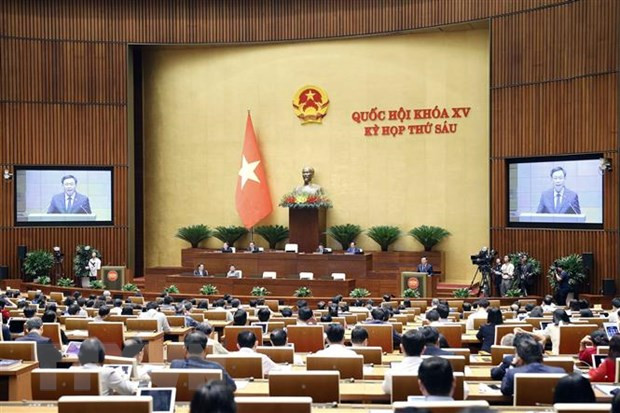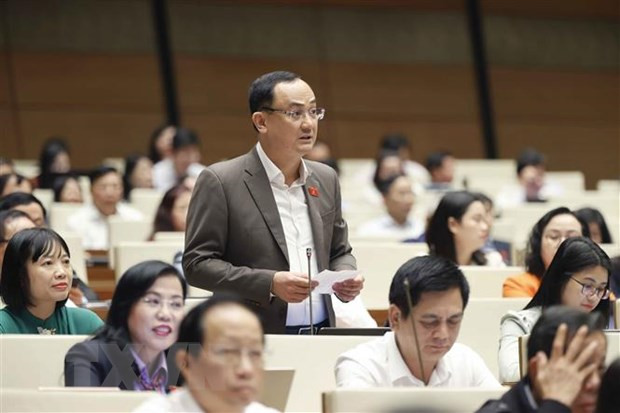Outstanding in 15 working days, with a serious spirit, focus, high responsibility, the 2.5-day question and answer session successfully completed the proposed program.

On the afternoon of November 10, the first session of the 6th Session of the 15th National Assembly successfully completed the proposed program content with outstanding highlights.
Expanded questioning, improving the quality of supreme supervision
Outstanding in 15 working days, with a serious spirit, focus, high responsibility, the 2.5-day question and answer session successfully completed the proposed program.
This is the first time in the 15th tenure that the Prime Minister, all Deputy Prime Ministers and 21 ministers and heads of sectors have directly answered questions from National Assembly deputies.
With a very wide scope, relating to 21 different fields, 10 resolutions of the National Assembly, on the basis of arrangement into 4 groups of fields according to the initiative of the National Assembly Standing Committee.
Many opinions emphasized that the National Assembly's questioning by field group this time is both pressure and motivation for "industry commanders" to see the need to increase responsibility and coordinate more to focus on solving problems under their responsibility.
"The National Assembly deputies demonstrated a high sense of responsibility, carefully studied the reports, asked concise, clear, focused questions, and went straight to the point. Government members and sector heads had a firm grasp of the current situation of their sectors and areas of responsibility, and basically answered frankly, explained seriously, clarified many issues, and proposed solutions to overcome them, including solutions with specific roadmaps.
The National Assembly acknowledges and appreciates the seriousness, openness, and sense of responsibility of Government members and sector heads in answering questions and absorbing opinions of National Assembly deputies," emphasized National Assembly Chairman Vuong Dinh Hue.
Based on the results of the questioning session, the National Assembly will consider issuing a resolution on the questioning at the end of the session.
In the first session, the National Assembly devoted the entire day of October 30 to conduct a supreme supervision session on the implementation of the National Target Programs on New Rural Construction, Sustainable Poverty Reduction, and Socio-Economic Development in Ethnic Minority and Mountainous Areas.
The discussion atmosphere was lively, frank and constructive. The opinions of the ministers, heads of sectors and Deputy Prime Minister clarified many issues under their assigned management responsibilities.
Regarding specific contents, National Assembly deputies highly appreciated the National Assembly's decision to supervise right during the implementation process in order to correctly identify results and difficulties to focus on removing and creating changes; the coordination of the Government, Government agencies, the active and effective participation of the Central Committee of the Vietnam Fatherland Front, People's Councils, People's Committees of provinces and cities, the State Audit Office, experts, scientists and National Assembly deputies... contributing to improving the quality of the National Assembly's supreme supervision...
Discussing at the meeting hall on the implementation of the National Assembly's resolutions on the three national target programs, delegates all agreed to extend the implementation period and disbursement of the central budget capital in 2023 for the three programs that have not been fully disbursed to continue implementation until December 31, 2024 and agreed to unify the system of common coordination offices of all three national target programs to improve the quality and effectiveness of coordination and integration in implementation and deployment.
It can be seen that the National Assembly always identifies innovation in supervisory activities as one of its focuses. Supervision, post-supervision or evaluation of the implementation of promises made by Government members and heads of sectors are always considered important.
With the spirit of early and remote initiative, the preparation for organizing the question and answer session was carefully considered. Through supervision, agencies can find appropriate solutions, close to the practical situation, closely following the Party's leadership, helping the country overcome the difficult period and continue to develop.
Complete the vote of confidence
On October 25, the National Assembly conducted a vote of confidence for 44 people holding positions elected or approved by the National Assembly, ensuring seriousness, correct content, process and procedures according to the provisions of law.
With the adoption of the Resolution confirming the results of the vote of confidence for those holding positions elected or approved by the National Assembly, the National Assembly has completed the vote of confidence at the 6th Session of the 15th National Assembly. This is an activity that attracts special attention not only from National Assembly deputies but also from a large number of voters, people and public opinion.
According to the National Assembly Chairman, the vote of confidence aims to improve the effectiveness and efficiency of the National Assembly's supervisory activities and improve the quality and efficiency of the State apparatus.
This is also an activity that contributes to assessing the prestige and performance of the assigned tasks and powers of the person whose confidence is voted on, helping the positions elected and approved by the National Assembly see their level of trust in order to continue to strive, practice, and improve the quality and efficiency of their work.
In particular, according to new regulations in Resolution 96 of the National Assembly, the results of the vote of confidence are also the basis for competent authorities to consider, plan, train, arrange and use cadres.
Targeting growth of 6-6.5% for 2024
This time, the National Assembly will spend 1.5 days (from the afternoon of October 31 to the end of November 1, 2023) discussing the socio-economic development plan; mid-term assessment of the implementation of the socio-economic development plan for 2021-2025; Economic restructuring plan for the 2021-2025 period; Results of the implementation of Resolution No. 43/2022/QH15 on fiscal and monetary policies to support the socio-economic recovery and development program, etc.

Many opinions highly appreciated the efforts and determination of the Government, all levels, sectors and localities in managing the economy; the participation and consensus of the entire political system, the business community and the people, in a very difficult context, they have made efforts to synchronously and flexibly implement groups of tasks and solutions and achieved important results in 2023. The National Assembly always accompanies the Government, the support of the National Assembly is very clear, practical, effective and timely.
At the hall, delegates focused on discussing and giving opinions on the implementation of the 2023 socio-economic development plan; the expected 2024 socio-economic development plan; socio-economic development indicators; openness and growth drivers of the economy; difficulties and challenges; shortcomings, limitations and causes.
Regarding solutions in the coming time, many delegates agreed with the 12 groups of solutions stated in the Government's Report.
The National Assembly voted to pass the Resolution on the 2024 Socio-Economic Development Plan with a majority of votes in favor (90.49%). The Resolution sets a target of a gross domestic product (GDP) growth rate of 6-6.5%.
On the last day of the first session (November 10), the National Assembly passed the Resolution on the State budget estimate for 2024 and the Resolution on the central budget allocation plan for 2024.
Also in the first phase, the National Assembly Standing Committee resolved to add to the 2023 Law and Ordinance Development Program to submit to the National Assembly for comments and approval at the 6th session (October 2023) according to the procedure at a session, the following draft resolutions: Resolution of the National Assembly on applying additional corporate income tax according to regulations against global tax base erosion; Resolution of the National Assembly on reducing value added tax (reported to the National Assembly for resolution in the Resolution of the 6th Session, 15th National Assembly).
It can be seen that the decisions made by the National Assembly were placed in the overall context associated with the goals of the 5-year socio-economic development plan for the 2021-2025 period on transforming the growth model, restructuring the economy, improving the investment and business environment, enhancing productivity, quality, efficiency and competitiveness of the economy according to the Resolution of the 13th National Party Congress and the Resolution of the National Assembly.
Commenting on the first session of the 6th Session, many voters nationwide highly appreciated the chairman's management as well as the quality of opinions raised by delegates at the discussion session.
The assignment of the National Assembly Chairman and Vice Chairmen to conduct each meeting is carried out scientifically and methodically, helping voters easily follow and grasp the issues.
Delegates have carefully prepared their speeches, which are frank and focused on issues of public concern nationwide.
The National Assembly has made many innovations in the organization of sessions, the contents of discussions in the hall and in group discussions. National Assembly deputies are very responsible, dedicated, spend a lot of time studying documents, and give profound, enthusiastic, and multi-dimensional speeches in many fields.
In particular, the large number of delegates registering to speak and participate in discussions and questions shows that the quality of delegates is increasingly high. Delegates spend a lot of time, enthusiasm, and knowledge to contribute to the draft law...
It can be seen that the spirit of innovation in the parliament has contributed to improving the effectiveness and efficiency of the National Assembly's operations; showing efforts in fulfilling promises to voters.
The workload of the 6th Session is very large, with many difficult and complicated issues, placing very high demands on the National Assembly, the National Assembly Standing Committee and each National Assembly delegate.
According to the program, after the end of Phase I, Phase II of the 6th Session will start from November 20 to November 29.
During the period from November 11 to 19, the National Assembly will take a break to allow the National Assembly agencies, the Government and relevant agencies time to absorb, rationalize and complete draft laws and draft resolutions.
This is the second time the National Assembly has arranged two sessions. This shows flexibility, adaptability and meeting practical requirements in the current period.
According to VNA